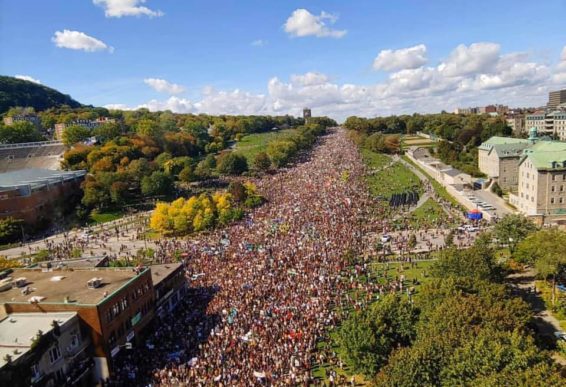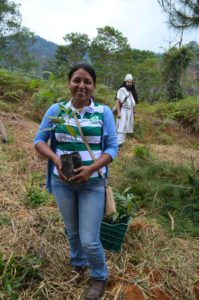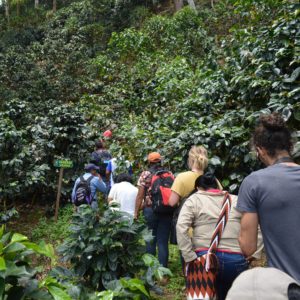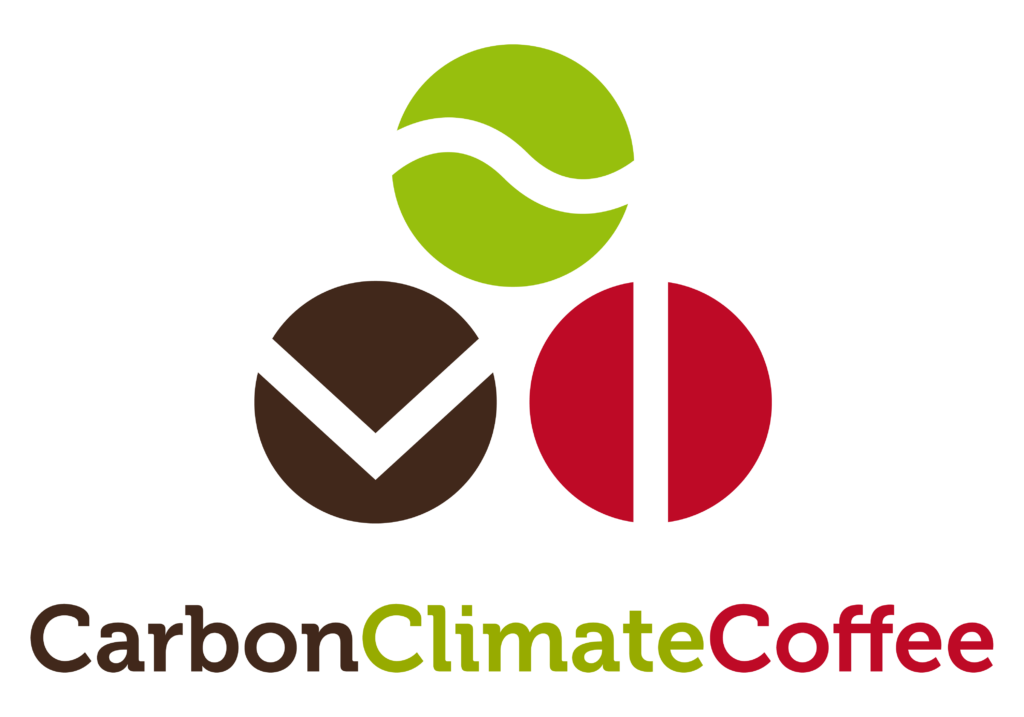
Sometimes climate change work can feel lonely and a bit depressing. But today, September 27, 2019, we were an estimated 500,000 people in the streets of Montreal with La Planète en Greve and millions more around the world celebrating the 52nd consecutive “Fridays for the Future” international, coordinated, climate strike – united under the banner of climate change ACTION.
 Many people carried hand-painted signs on scraps of cardboard or re-utilized posters, protesting in the streets for the planet. But in truth, we’re protesting for our own survival and for a world-wide call to action to put the brakes on runaway climate change.
Many people carried hand-painted signs on scraps of cardboard or re-utilized posters, protesting in the streets for the planet. But in truth, we’re protesting for our own survival and for a world-wide call to action to put the brakes on runaway climate change.
The Intergovernmental Panel on Climate Change (IPCC) recently released its Special Report on Climate Change and Land* — which looks beyond greenhouse gas emissions and embraces the full complexity of issues surrounding land use and climate change.
The International Federation of Organic Agriculture Movements (IFOAM) – Organics International has enthusiastically embraced the Special Report on Climate Change and Land, especially in regards to the balanced emphasis on mitigation and adaptation and the concerns about the adverse impacts of land-use to produce “bioenergy” – most often resulting in the deforestation of massive land swathes.
 “The climate and biodiversity loss crises are two sides of the same coin, which need to be addressed in synergy,” says Gábor Figeczky, Head of Global Policy. “The IPCC’s land report scientifically demonstrates once again how business as usual cannot be our way forward.”
“The climate and biodiversity loss crises are two sides of the same coin, which need to be addressed in synergy,” says Gábor Figeczky, Head of Global Policy. “The IPCC’s land report scientifically demonstrates once again how business as usual cannot be our way forward.”
At CoopCoffees we strive to do business differently, and have tried to stay one step ahead of this call to action. Since 2013 we’ve mobilized our network of roasters and allied organization to provide clear and positive climate action. For example, in response to the devastating impact of the climate-induced, coffee leaf-rust fungus that swept across Central America, we charged to roasters an additional 5-cent/lb on particularly hard-hit coffees, and channeled financial support via this “Roya Relief Fund” back to affected producer organizations. But we quickly learned that “leaf rust” was not the problem, rather a symptom of the much broader climate change challenge and directed our support accordingly.
 In 2017, we launched a supply-chain wide 3-cent/pound “carbon tax” that’s channeled to support learning and application of best regenerative organic and agro-ecology practices with interested producer partners around coffee-production regions.
In 2017, we launched a supply-chain wide 3-cent/pound “carbon tax” that’s channeled to support learning and application of best regenerative organic and agro-ecology practices with interested producer partners around coffee-production regions.
And today in 2019 we’re launching our first pilot plots, with the application of the Cool Farm Tool – a farmer-facing emissions calculator, which in the case of regenerative-organic and stratified-shade covered coffee farmers — will demonstrate the extent to which this agro-forestry production model is providing significant, carbon-sequestration and environmental services. Our ultimate goals include: highlighting the farmers who are in fact the real “climate heroes” and to make their successful production practices more visible to farmers around the world; begin paying environmental service or “carbon premiums” to carbon-sequestering farmers; and finally, to challenge the rest of industry and coffee consumers to contribute a fair price to compensate farmers for their production and environmental service efforts.
The IPPC report eliminates any doubt about the urgent need to transform our food systems, which are estimated to cause between 19-29% of global anthropogenic greenhouse gas (GHG) emissions. Crop and livestock production alone lead to 10-12% of all human-related greenhouse gas emissions, according to the IPCC. Deforestation and other changes in land use contribute to an additional 9-11% of GHG emissions. Astonishingly, agriculture is also directly responsible for 80% of deforestation worldwide, according to estimates.
Coffee is one of the most valuable tropical export crops on Earth, and is cultivated on more than 27 million acres. Small-scale farmers produce about 70 percent of the world’s coffee, and as many as 120 million people depend directly or indirectly on coffee production for their economic survival. If we can get this right… our potential for positive impact is ENORMOUS.
 “The world’s leading scientists are clear – the way we produce food and manage land must change dramatically if we are to avert catastrophic climate change. Farming must work with nature, not against it,” explains Teresa Anderson, climate policy officer for ActionAid International. “The IPCC’s land report puts a big question mark on the future of industrial agriculture. A major shift to farming approaches that work with nature, reduce emissions, empower women farmers and improve resilience to the impacts of climate change, is now essential.”
“The world’s leading scientists are clear – the way we produce food and manage land must change dramatically if we are to avert catastrophic climate change. Farming must work with nature, not against it,” explains Teresa Anderson, climate policy officer for ActionAid International. “The IPCC’s land report puts a big question mark on the future of industrial agriculture. A major shift to farming approaches that work with nature, reduce emissions, empower women farmers and improve resilience to the impacts of climate change, is now essential.”
With millions of people mobilized today for a safe climate transition – one easy and delicious, “win-win” lifestyle shift is to choose regenerative-organic coffee, grown in agro-forestry systems by small-scale farmers and their families!
* The IPCC’s new report follows its previous ‘Special Report on the impacts of Global Warming of 1.5°C Above Pre-industrial Levels and Related Global Greenhouse Gas Emission Pathway (link is external)‘, which was released in October 2018. It also follows the recently published IPBES ‘Global Assessment on Biodiversity and Ecosystem Services (link is external)‘, which highlights how species extinction rates are accelerating and nature is declining globally at rates unprecedented in human history.
Author: Monika Firl
September 28, 2019






















